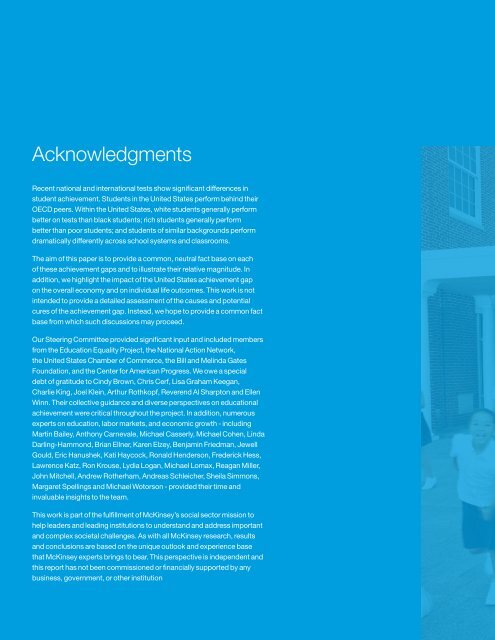Institutional Racism
Institutional Racism
Institutional Racism
Create successful ePaper yourself
Turn your PDF publications into a flip-book with our unique Google optimized e-Paper software.
2<br />
Acknowledgments<br />
Recent national and international tests show significant differences in<br />
student achievement. Students in the United States perform behind their<br />
OECD peers. Within the United States, white students generally perform<br />
better on tests than black students; rich students generally perform<br />
better than poor students; and students of similar backgrounds perform<br />
dramatically differently across school systems and classrooms.<br />
The aim of this paper is to provide a common, neutral fact base on each<br />
of these achievement gaps and to illustrate their relative magnitude. In<br />
addition, we highlight the impact of the United States achievement gap<br />
on the overall economy and on individual life outcomes. This work is not<br />
intended to provide a detailed assessment of the causes and potential<br />
cures of the achievement gap. Instead, we hope to provide a common fact<br />
base from which such discussions may proceed.<br />
Our Steering Committee provided significant input and included members<br />
from the Education Equality Project, the National Action Network,<br />
the United States Chamber of Commerce, the Bill and Melinda Gates<br />
Foundation, and the Center for American Progress. We owe a special<br />
debt of gratitude to Cindy Brown, Chris Cerf, Lisa Graham Keegan,<br />
Charlie King, Joel Klein, Arthur Rothkopf, Reverend Al Sharpton and Ellen<br />
Winn. Their collective guidance and diverse perspectives on educational<br />
achievement were critical throughout the project. In addition, numerous<br />
experts on education, labor markets, and economic growth - including<br />
Martin Bailey, Anthony Carnevale, Michael Casserly, Michael Cohen, Linda<br />
Darling-Hammond, Brian Ellner, Karen Elzey, Benjamin Friedman, Jewell<br />
Gould, Eric Hanushek, Kati Haycock, Ronald Henderson, Frederick Hess,<br />
Lawrence Katz, Ron Krouse, Lydia Logan, Michael Lomax, Reagan Miller,<br />
John Mitchell, Andrew Rotherham, Andreas Schleicher, Sheila Simmons,<br />
Margaret Spellings and Michael Wotorson - provided their time and<br />
invaluable insights to the team.<br />
This work is part of the fulfillment of McKinsey’s social sector mission to<br />
help leaders and leading institutions to understand and address important<br />
and complex societal challenges. As with all McKinsey research, results<br />
and conclusions are based on the unique outlook and experience base<br />
that McKinsey experts brings to bear. This perspective is independent and<br />
this report has not been commissioned or financially supported by any<br />
business, government, or other institution

















